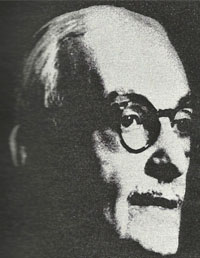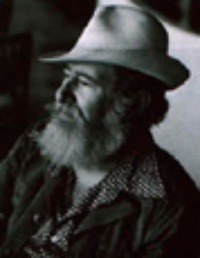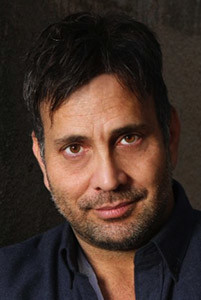

CHARLES JEHLINGER (1866-1952)
 Jehlinger was one of the most important (even if largely unknown) non method acting teachers in America and taught for nearly 50 years at The American Academy of Dramatic Arts. Among his pupils were Cecil B. DeMille, Edward G. Robinson, Spencer Tracy, Hume Cronyn, Kirk Douglas, Anne Bancroft and Robert Redford. The legend is that he taught Cecil B De Mille in his first class and Robert Redford in his last class. In his memoir, “The Ragman’s Son,” Kirk Douglas dedicates three pages to reminiscences of Jehlinger. Likewise, Hume Cronyn in his memoir, “A Terrible Liar,” tells of Jehlinger getting in his face on day and telling him,”You’re a fool, boy. Oil and water won’t mix. You can’t criticize and create at the same time. You’re a fool.”
Jehlinger was one of the most important (even if largely unknown) non method acting teachers in America and taught for nearly 50 years at The American Academy of Dramatic Arts. Among his pupils were Cecil B. DeMille, Edward G. Robinson, Spencer Tracy, Hume Cronyn, Kirk Douglas, Anne Bancroft and Robert Redford. The legend is that he taught Cecil B De Mille in his first class and Robert Redford in his last class. In his memoir, “The Ragman’s Son,” Kirk Douglas dedicates three pages to reminiscences of Jehlinger. Likewise, Hume Cronyn in his memoir, “A Terrible Liar,” tells of Jehlinger getting in his face on day and telling him,”You’re a fool, boy. Oil and water won’t mix. You can’t criticize and create at the same time. You’re a fool.”
DON RICHARDSON (1919-1996)
 Don Richardson, who was mentored by Jehlinger, was an author, acting teacher and director. Don was an original member of the Group Theater, which was the nucleus of Acting in the United States. His fellow students were Sanford Meisner, Stella Adler and Uta Hagen, but Don was the only student from the Group Theater who said, “The Method isn’t what acting is about.” He directed over 800 television shows in his time. Some of these include: “Get Smart”, “One Day at a Time”, “Lost in Space”, “The Defenders”, and “Bonanza”. Don also directed theatre productions on Broadway, won numerous Emmy awards and taught actors for over 40 years. Some of his legendary clients include Grace Kelly, Anne Bancroft, Zero Mostel, and Spencer Tracy, to name a few.
Don Richardson, who was mentored by Jehlinger, was an author, acting teacher and director. Don was an original member of the Group Theater, which was the nucleus of Acting in the United States. His fellow students were Sanford Meisner, Stella Adler and Uta Hagen, but Don was the only student from the Group Theater who said, “The Method isn’t what acting is about.” He directed over 800 television shows in his time. Some of these include: “Get Smart”, “One Day at a Time”, “Lost in Space”, “The Defenders”, and “Bonanza”. Don also directed theatre productions on Broadway, won numerous Emmy awards and taught actors for over 40 years. Some of his legendary clients include Grace Kelly, Anne Bancroft, Zero Mostel, and Spencer Tracy, to name a few.
BRAD HELLER (Present)
 Brad Heller, who was mentored by Don Richardson, is an actor, teacher and director. Brad was Don’s protege and after Don’s passing, Brad began teaching and coaching this revolutionary non method acting technique at UCLA for 5 years and privately in his own school. Brad built a very successful acting and producing career, appearing in hundreds of TV shows, commercials, and films. Most recently, guest starring in a very well received role on “Criminal Minds” and in the Academy Award Nominated film, “MOST.” Brad feels compelled to carry out Don’s legacy. He’s taken many actors from beginner to master in a very short period of time. Brad Heller is widely considered as offering the best acting classes in Los Angeles, and the best acting coach in Hollywood.
Brad Heller, who was mentored by Don Richardson, is an actor, teacher and director. Brad was Don’s protege and after Don’s passing, Brad began teaching and coaching this revolutionary non method acting technique at UCLA for 5 years and privately in his own school. Brad built a very successful acting and producing career, appearing in hundreds of TV shows, commercials, and films. Most recently, guest starring in a very well received role on “Criminal Minds” and in the Academy Award Nominated film, “MOST.” Brad feels compelled to carry out Don’s legacy. He’s taken many actors from beginner to master in a very short period of time. Brad Heller is widely considered as offering the best acting classes in Los Angeles, and the best acting coach in Hollywood.
The Non Method Acting Technique we teach at The Heller Approach are based upon the lessons of the late Don Richardson, author of “Acting Without Agony: An Alternative to The Method“.
Mr. Richardson devised an acting technique that was quite different from the torturous ‘Method.’ If you ever studied ‘Method’ acting, then you know that specific types of acting techniques can be painful, even torturous. Some have said that the acting technique they have used is even worse than therapy. Well, there is an alternative to this. You can learn an easier non-method acting technique which has been used for many years by legendary actors!
There are many different types of entertainment we play: Drama, comedy, farce, modern tragedy, mystery, etc…. We have only named a few but as actors need to know how to play them all. **In fact, all different styles of entertainment have a different purpose in how they are to affect the audience.
Here are some brief examples:
*In a Drama the goal is to Move the audience to Feel.
*In a Comedy the goal is to Amuse the audience.
*In a Farce the goal is to get ‘Big Laughs.’
*In a Mystery the goal is to induce as much tension into the audience as possible and keep them on the edge of their seats.
There are specific tools we give you to help you mold the audience and get the crowds laughing where you want them to, or move them to tears at a specific dramatic moment.
One of the main principles of the non-method acting technique used at The Heller Approach acting school pertains to ‘evoking emotion.’ Emotion is the intensity you feel in your body when you are angry, sad, happy, anxious, etc… It’s the intensity that you feel in every pore of your body when you are really happy. At the Academy we teach actors how to create this quality on command, in a very quick and reliable way.
As actors, it doesn’t matter what we do to ‘jazz up a scene’ if it’s not real and believable. Remember that being real is acting. It’s not about ‘doing a tap dance.’ Although we address creating interesting moments in a scene to get laughs or create suspense, even more focus is placed on being a real person in the scene. You will ‘wow the audience’ by bringing yourself to the role and really believing that you are the character you’re playing in the given scene – reacting to the given circumstances as a real human being.
Teaching comedy is one of the things we specialize in. Many actors and comics come to us so that they can learn how to get laughs in a scene when they are playing a believable character. There are specific principles of comedy – from how to set up a joke, to specific tools to get the audience laughing exactly where you want them to. Comedy is like a science and needs to be very specific. The timing of a joke can make or break the moment. Acting in a comedic role can be a lot of fun when you know the tools; otherwise, it can be very intimidating.
*The good thing is that comedy can be taught. Many of our students work regularly on sitcoms, commercials and comedic films. Some are stand up comedians who want to learn how to use their comedic ability in a role and still keep the character real and believable, and some are actors who want to not just play dramatic parts, but to play comedy, too.
After all, most of the shows on television are comedic, and if you can’t play a comedy, you’re eliminating a significant amount of potential work. The important thing to remember is that once you know the tools of comedy, it’s very exciting to plan your performance and get the crowd laughing when and where you want!
After you book the acting job, you will need to build the role. To do this you must create a character that has a lasting impact on the viewer. With regards to scene study, the students bring in a prepared scene to group acting class that they find on their own or one that is given to them by the instructor. Then rehearse it outside of class (at a planned rehearsal) and perform it in class soon after. The instructor will give them notes on how to improve it, and the students work on it the following week, and bring it in again.
Some of the most essential tools necessary to ‘WOW’ and amaze the casting director in order to leave a memorable impression include:
*Taking risks in your choices but making sure you’re still telling the story the way the author intended it to be told.
*How to react and listen in the scene.
*When to look up from the scene and when it’s OK to read the lines if they aren’t memorized.
*How to prepare for the audition.
*Over-learning the role so that you can perform at your potential under duress and pressure.
*Bringing yourself to the role.
*Take over the room and entice the casting director to want to know you.
*Last but not least, how to rehearse for an audition when you don’t have a scene partner to practice with, and making the scene real to you.
Visit Brad’s YouTube channel for great FREE acting tips.